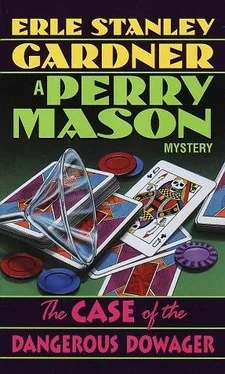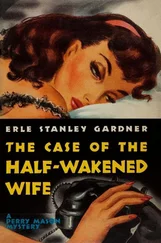Drake fidgeted uneasily and said, "I should never have hired the fellow in the first place. His record isn't any too good. And I certainly shouldn't have let him get aboard that ship, in view of the fact that he knew Duncan and Grieb. I sent Staples down to the pier to relieve him. Sylvia Oxman had gone aboard before Staples got there, so he didn't pick her up until after she'd left the ship. Then he relieved Belgrade and took up the shadowing job. Staples was the man I wanted for the job all along. He'd been covering her apartment."
Mason said slowly, "Then Belgrade was relieved before Sylvia went into hiding, is that right?"
"Yes."
"Therefore," Mason went on, "Belgrade can't tip the newspaper off to where Sylvia is now?"
"That's right. Staples picked her up at the wharf and shadowed her into the Christy Hotel, and bribed a bellboy to give him her room number - 318. I reported to Della."
"Yes, I know," Mason interrupted, "Della told me."
Drake said, "Well, I wanted to get that off my mind, Perry. You've been damned white about it, but it was a blunder on my part. I shouldn't have let Belgrade have anything to do with the case. So much for the bad part. Now for the good part: I think we've got something that's going to put us in the clear."
Drake turned to Manning, said, "Turn around, Arthur, so Mr. Mason can see your face. I'm going to ask you some questions and I want you to..."
"I can tell my story," Manning said eagerly, "and then you can..."
"No," Drake interrupted, "I want to ask you questions. That's the way your story would come out in court or in front of a grand jury, and I want Mason to see how you handle yourself on answering questions."
"Okay," Manning said with a grin, "fire away."
"How long have you been out there on the gambling ship?"
"Ever since it started."
"And you were friendly to Grieb and unfriendly to Duncan?"
"Not exactly. My original contact was with Duncan. He got me the job. But Duncan was the outside man. Grieb was the inside man. Duncan was in the city most of the time buying supplies, handling publicity, making arrangements with the speed boat men, looking after political fences to keep the beach cities from passing ordinances putting the speed boat men out of business, and all that sort of stuff. So naturally I was thrown more and more in contact with Sam Grieb. Then they commenced to start fighting over little things, and I tried to keep neutral. Gradually I found Duncan was steering clear of me, and Grieb was taking me into his confidence. I tried to keep things from drifting too far that way, but I didn't want to put myself in a position where I had both Grieb and Duncan sore at me; and I figured Grieb was going to come out on top because he was the one who had the money."
"Now then," Drake said, glancing meaningly at Mason, "who murdered Grieb?"
"Nobody."
"How do you figure that?" Drake asked.
"Well, Grieb and Duncan had some IOU's signed by Sylvia Oxman. Grieb was trying to peddle them at a premium, if he could. He had an idea Frank Oxman would pay a bonus to get hold of them.
"Duncan was anxious to get them in the form of cash, because Duncan knew there was going to be a bust-up of the partnership and he figured it would be easier to divide cash than to hold the sack of notes. So Duncan and Grieb had a big fight yesterday afternoon and Duncan made Grieb promise that he'd get those IOU's reduced to cash by seven o'clock that night. Grieb was going to get a premium for them if he could, and, if he couldn't, he was going to let them go for their face value. It seems Mr. Mason had thrown an awful scare into them when he started handling Sylvia's case.
"Now, I was sticking around the offices until about fifteen or twenty minutes before Duncan came in and discovered the murder, and I know Grieb was alive when I left. He sent for me and said the crap table had a slicker working the game, and sent me over there to take a look. Now, no one had come in who could have paid off those IOU's before I went over to the crap table. Three people went in afterward - Sylvia, Frank Oxman, and Mr. Mason. After Duncan found the body, the IOU's were gone, and there was seventy-five hundred bucks in the desk drawer. That was just the amount of those IOU's, so I figured Oxman must have paid them off. Sam held out for a premium and Oxman wouldn't give it to him, so finally Sam took just the face value of the IOU's."
"Then Oxman must have been in there long enough to have talked with Grieb. Is that right?" Drake asked.
"Yes, that's right. I saw him go in. I didn't see him come out. I thought I was keeping my eye peeled all the time, but you know how it is when you're watching a dice slicker, and Oxman must have gone out without my seeing him. It's a cinch someone paid off those IOU's. I don't think the dame did it. She didn't have the dough for one thing."
"Well, then," Mason said, "what you're getting at is that Oxman must have killed him."
"No," Manning said, vigorously shaking his head, "it all builds up to the fact that Oxman didn't kill him."
Drake said, "Wait a minute, Perry, and let me handle this. I know the whole story... Now, Arthur, why do you think Oxman didn't kill him?"
"Because if Oxman had paid off those IOU's and then killed him, he certainly wouldn't have left the seventy-five hundred dollars in the desk drawer, and if he'd killed him before he'd paid the IOU's, he'd never have left the money there."
Mason's face showed disappointment. He said, "I'm sorry, Paul, but this isn't getting us anywhere. This guy's deductions are just deductions. Anyone can guess what happened from..."
"Wait a minute," Drake interrupted significantly.
Mason caught the look in the detective's eye and became silent.
"Now then," Drake said, "having figured that Oxman didn't kill him, who did?
"Well, like I said," Manning remarked, "I don't think anyone killed him."
"How did he die, then?"
"He committed suicide."
"What makes you think he committed suicide?"
"I think Duncan had the goods on him. I think Sam had been dipping into the partnership funds. Duncan suspected it. Grieb put most of his money in the business and then had some losses in the stock market. Grieb handled all the money. I think he knew Duncan was calling for a showdown and knew that, as soon as a receiver stepped in, Duncan could send him to jail, and he knew Duncan wouldn't want anything better than that.
"The only chance Grieb had to make a killing was to get Oxman to pay a fancy sum for those IOU's. I think at first Grieb thought he could get maybe ten thousand bucks premium and make Oxman promise never to say anything about it. Then Grieb could have told Duncan that Oxman wouldn't pay any premium for the notes and he'd had to let them go for their face value. That would have suited Duncan all right for he'd never have checked up on it, and Grieb could have used the extra cash to square off his shortage."
Mason said impatiently, "Damn it, Paul, this isn't getting us anywhere. I can think up a dozen different theories that..."
He once more stopped in mid-sentence as he caught the look in Drake's eyes.
"Now, what makes you think Grieb could have committed suicide?" Drake asked. "The police experts all say it was murder."
"I know they do, but the reason they say that is because they can't find the gun. Now, Grieb was killed with a .38 caliber automatic that he ordinarily kept in the upper left-hand drawer of his desk."
"How do you know?" the detective asked.
"Why, we went over all that in your office," Manning said.
"Never mind what we went over in my office," Drake told him. "You just begin from scratch and tell Mr. Mason the whole story. I want him to hear it the way you tell it and not the way I'd try to tell it."
"Well," Manning said, "it's this way. First, you've got to consider the type of man you're dealing with. Charlie Duncan is a smart hombre. He keeps his face buttoned up until he's ready to say something, and when he says something it's a mouthful. But most of the time he's just sitting on the side lines sizing things up; but he doesn't give you that impression, because of those gold teeth of his. He keeps his mouth open in a grin and the gold teeth sort of draw attention to the fact that he's grinning. People don't look at his eyes, they look at his teeth. Now, I know this, because I know Charlie Duncan. I've known Charlie Duncan for ten years, and I know the way he works. He thinks fast and he doesn't say much. Most people figured Sam Grieb was the big-shot of the business, because Sam was always acting like the big executive. Sam liked to sit behind his desk and impress people, while Duncan liked to get out on the firing line and slip things over. Left to himself, Grieb could never have kept that business going because he didn't have brains enough to handle the political end."
Читать дальше












